''Russia didn’t look how the foreign mass media describe it'': WC conclusions drawn in Kazan
How much money did fans leave in Kazan during the WC? When did Igor Butman start to love the capital of Tatarstan? What's the size of Tatneft's capitalisation in 2017? When will the landfill next to Sredny Kaban Lake be eradicated? How does a waste incineration plant in Switzerland look inside? These and other questions became topics of the next edition of 7 Days weekly informative and analytic programme, which airs on TNV channel. Realnoe Vremya tells the details.
WC results in Kazan: guests' expenses amounted to 11,2bn rubles for four weeks
The FIFA WC, which Kazan hosted at a decent level, ended last week in Kazan. Regional bodies of authority, law enforcement agencies, municipal services, stadiums, transport, hotels, public catering, volunteers, Tatmedia journalists, including TNV team, which participated in the organisation of the cup's press centre's work – everybody worked great, notes 7 Day's host Ilshat Aminov.
According to tourists' opinion, Kazan is third after Saint Petersburg and Moscow as the most beautiful and hospitable FIFA WC city in Russia. More than 300,000 fans have visited the capital of Tatarstan.
TNV correspondents made up the top 3 brightest things that appeared thanks to the WC in Kazan: a night boulevard from Kozya Sloboda metro station to Sibgat Khakim Street, an updated territory next to the Cup where the Fan Fest took place and, thirdly, the graffiti that were bad luck for the football stars who are depicted on them: their national teams lost in Kazan and said goodbye to the cup.
''The football brought many bright, unforgettable emotions,'' noted Tatarstan Minister of Sport Vladimir Leonov. ''The cup's guests liked the capital of Tatarstan so much that they decided to certainly come again. All WC services in Kazan worked accurately and coherently. We should thank everybody because the level of English, approaches, client orientation… We've always stressed we're one of the most experienced and could become stronger and better.''
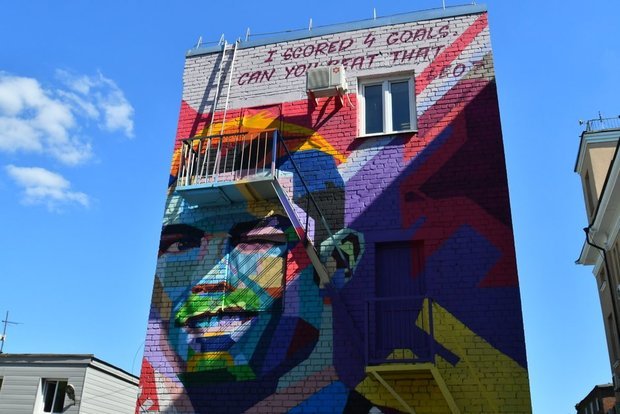
The graffiti that were bad luck for the football stars who are depicted on them: their national teams lost in Kazan and said goodbye to the cup. Photo: Maksim Platonov
The tourism committee calculated the guests' expenses in Tatarstan amounted to 11,2bn rubles during the cup, a fan's average bill was 37,000 rubles. Tourists from 30 countries who came spent three days in Kazan. A fan from Australia set a record – he lived for 24 days. A walk by cycle rickshaw was the most popular service. And the most popular point to take photos is in the Kremlin.
Galina Sharafutdinova, executive director of the Association of Restaurateurs of the Republic of Tatarstan, said an average restaurant bill was from 1,000 to 1,500 rubles, in café – the bill was equal to 300-500 rubles. ''Cafes and restaurants didn't raise prices at the cup,'' she noted. ''On the contrary, they additionally offered edible compliments at an establishment's expense. Chefs elaborated a new menu. But the fans ate triangles and drank a tonne of beer in Kazan most.''
The cup's guests noted Kazan's hospitality and claimed that kind, friendly and responsive people lived here. A video of an old woman playing the piano in the street is gaining popularity in social networks. Foreign fans asked her to play as an encore several times. There is an example of kindness and responsiveness: citizens of Kazan helped a fan with disabilities from Colombia. His wheelchair's accumulator gave up, he asked for help in social networks. Citizens decided to help, brought a new wheelchair, and the fan could see the match. ''When I arrived in Russia and started to have problems, I was very surprised at how people responded to my problem! People are amazing here,'' Julio Pico stressed the Kazan citizens' responsiveness.
There is another example: employees of the urban press centre of Kazan helped a Bangladesh TV channel's sports editor Nasimul Hasan to get the equipment he had left in a taxi. ''I lost the tripod in the taxi but I didn't know the driver's phone number. I said about it to the press centre's employees. And before the game between Brazil and Belgium, I got an email: 'We've found your tripod.' I'm happy. People in Kazan, the employees of the press centre are all very welcoming, they help a lot. We make ourselves at home,'' said Nasimul Hasan, NTV channel's editor.
There were created comfortable working conditions for journalists during the cup. Journalists from Russia and 17 countries of the world worked closely in the urban press centre, there were held 43 press conferences with 56 speakers.
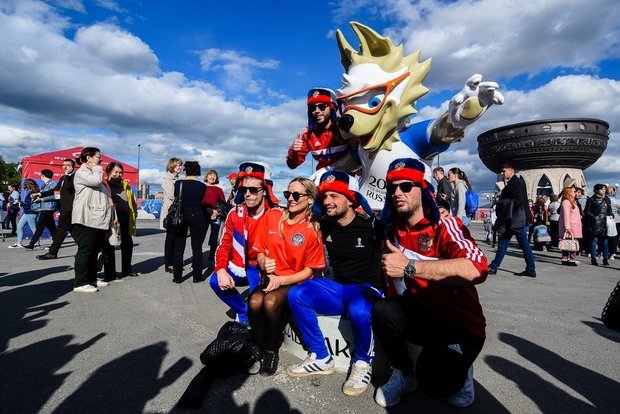
The cup's guests noted Kazan's hospitality and claimed that kind, friendly and responsive people lived here. Photo: Oleg Tikhonov
''TNV's task was to provide the press centre with technical infrastructure. And, in my opinion, it's completed it successfully. We built the electricity grid from scratch, we worked together with ICL, which supplied computers, with Tattelecom, which provided communication, and with IT-Park's employees,'' said Vladimir Matveyev, deputy director general of Novy Vek TV and Radio Company on regional development and technical director.
A special illumination system was designed and installed for the press conference hall, so that the picture was worthy of federal and all other channels. The press centre hosted interactive events and masterclasses, there was a transmission of matches and free halal food for journalists. Minister of Informatisation and Communications of the Republic of Tatarstan Roman Shaikhutdinov draw conclusions of the work of the telecommunication infrastructure: ''Everything was at a high level. A unique network of long-range Wi-Fi opened in the stadium. 70,000 fans have used it. A record traffic volume per device was detected in the game France – Australia. After the 6 matches, fans started to post photos on Facebook and Instagram more often, only 3% of fans uploaded videos on YouTube.''
Kazan Arena whose maximum capacity is 42,873 was full in the matches France – Argentina and Brazil – Belgium. 57,000 FAN IDs were issued in Tatarstan, 28,000 were made through FAN ID portal, 29,000 were printed in FAN ID centres. Foreigners got 54% of FAN IDs.
''The republic's president also noted the high organisation of the World Cup in Kazan. A coherent work of all services allowed to stage the WC in the capital of Tatarstan at such a good level,'' claimed Liliya Galimova, the official representative of the Kazan Kremlin, at a briefing.
Unfortunately, the World Cup ended, but Kazan has a new championship ahead the capital of Tatarstan will host in a year – WorldSkills 2019.
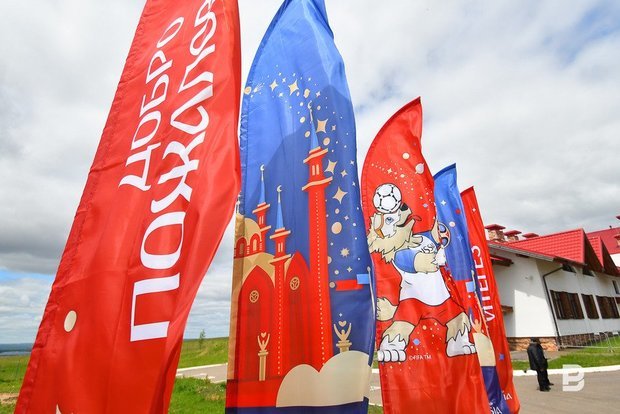
The World Cup ended, but Kazan has a new championship ahead the capital of Tatarstan will host in a year – WorldSkills 2019. Photo: Maksim Platonov
''We've proved we are hard-working, kind and strong people''
Many famous artists and musicians visited Kazan during the WC. Igor Butman, popular artist of Russia, jazz musician also visited the city. TNV's correspondent Timur Bikmurzin met and talked with him.
Mr Butman, as far as I'm concerned, you love Kazan, our audience who has an eye for jazz very much. Is it true?
Yes, and this love began a long time ago when I was first here with Lundstrem's orchestra in 1993. Thanks to football, many people from far and near abroad countries have known what Russia, Tatarstan, Kazan and other cities of countries are. Tribute should be paid to our officials' wisdom – the president and all the people who supported, everybody who made this holiday, built the stadiums, fan zones, held concerts. This all shows our country in a different way, not like the foreign mass media describe it. We have things to work on, but we've proved we are hard-working, kind and strong people. We shouldn't be offended, we're always ready to give a hug, host, feed. This should be remembered, and we should continue the tradition.
Tatneft's capitalisation crossed the bar of 1 trillion rubles in 2017
Two kerosene and diesel fuel hydrotreating plants at once were launched in TANECO oil refinery last week. Tatarstan President Rustam Minnikhanov took part in the official launch. According to him, the investments to launch the plants totalled 13 billion rubles. The oil refinery's capacities will double till the end of the year thanks to the new plants.
The event became a kind of gift by oil workers' professional holiday – the 75 th anniversary since the beginning of industrial crude oil refining in Tatarstan, while the Oil Summit was a site to exchange experience in implementing highly effective technologies and discuss topical questions of the sector.
According to preliminary results of the first half, the republic produced more than 17 million tonnes of oil. Production reduced by 0,7% in comparison with last year's analogous period. This happened because Russia met the OPEC+ international deal conditions. Despite the challenges, Tatneft's contribution to the republic's social and economic development still remains high. ''The slight reduction of production didn't impede the oil workers from increasing production volumes. Despite a considerable rise in tax payments and deductions to oil's prime cost, taxable income has grown in the sector,'' claimed Rustam Minnkhanov.
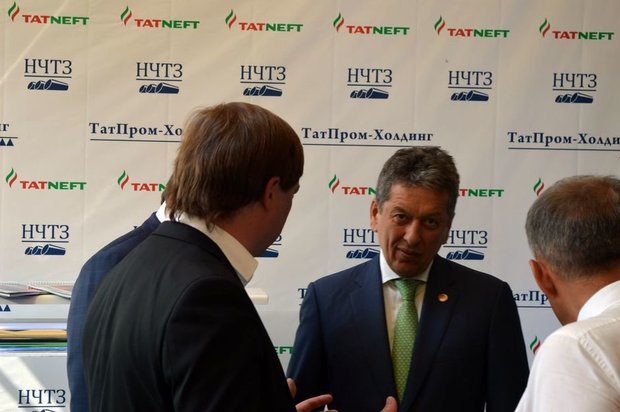
Tatneft Director General Nail Maganov noted Tatneft PJSC's capitalisation crossed the bar of 1 trillion rubles last year. The growth in 2017 totalled 20% in comparison with 2016. ''Today Tatneft's capitalisation is already more than 1,5 trillion rubles, or $25,4 billion,'' Maganov added.
It seems that 'light oil's days are already over. At the same time, world demand for crude oil doesn't reduce. Specialists say the share of tight oil reserves in the production structure is more than 60% in Russia today. It means new advanced oil production technologies are needed. Over 200 new wells will be built in Tatarstan on the basis of Russian equipment. Modern Russian developments were implemented in two big new plants of TANECO. The new industrial plants will allow to process 1,6 million tonnes of diesel fuel and 500,000 tonnes of high-quality jet fuel a year. This year, the oil refinery plans to start premium benzene production. By 2020, production volume plans to reach 12 million tonnes a year and 15 million tonnes by 2023. The refinery will make about 8 million tonnes of diesel fuel, over 3 million tonnes of motor fuels and 1 million tonnes of jet fuel.
''We purchase equipment abroad too. Today we've put two big plants in operation at TANECO. And there is a small part of imported products – compressors, pipes, the rest is Russian in origin,'' noted Rustam Minnikhanov. The launch of the new plants at TANECO can positively affect prices in petrol stations. As for today, representative of the federal agency assured at the Oil Summit the situation with restricted fuel prices was under the government's control. His agency doesn't have accurate forecasts, but an unjustified rise won't be permitted.
Every billion of tonnes of oil produced in Tatarstan is labour of more than one generation of people. And human capital is important in the oil industry. According to the president, right people, their knowledge, skills and experience are the biggest value. For this reason, it's necessary to create all conditions for life and professional growth of every person who works in this uneasy sphere. ''A higher oil school of the international level will appear in Almetyevsk. There must be such a centre,'' the Tatarstan president claimed at the Oil Summit.
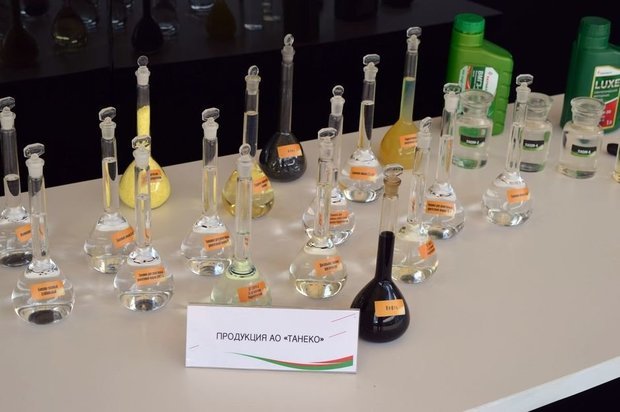
Landfill near Sredny Kaban to be eradicated by autumn
Citizens of Kazan daily drop 1,600 tonnes of litter, while its amount reaches up to 600,000 tonnes a year. Now there are 115 ha of land for official landfills around the city for, excluding illegal places to drop litter. It will be necessary to allocate 200 ha of land for landfills in 20 years. Sredny Kaban Lake's bank suffers from illegal places where waste is accumulated. What's more, Sredny Kaban Lake is a frequented place for the citizens. A new embankment opened here one week before the World Cup.
However, the fish rot and have a disgusting smell along the bank, the bank itself is full of litter. Meanwhile, the official opening of the lake's embankment is already close – in August. Emil Nigmatullin, a participant of regional School Eco Raid contest, was first to raise the alarm. During a walk along the bank, he found piles of litter. Schoolchildren decided to clean the territory on their own. ''We've cleaned the whole bank of Kaban but didn't get to Sredny because we were too tired. A KAMAZ truck was full of the litter we collected, but it becomes dirty anyway,'' Emil Nigmatullin complained.
Dacha owners going back from Kalinovsky settlement drop litter. There are also residues after citizens' picnics, people who love to cook shashlik and swim. Emil and his mother turned to the district's head asking to help to eradicate the landfill. Andrey Lobov replied the territory wasn't on the list of facilities, and there wasn't allocated money to maintain it. The territory is cleaned on Sundays, while a municipal contract is needed to eradicate the landfill. ''The territory is protected, it must be protected every day and every hour. This is why money must be given for it, an organisation must be responsible for this part of Kaban Lake,'' Emil's mother thinks.
Activists asked the district's head to put a barrier, so that cars won't approach the water and drivers won't be able to wash them in the lake. The head replied the budget didn't plan money to put a barrier. Now a fallen tree impedes the cars from reaching the lake. Those who go to the lake go under it. It's important it won't fall, so there won't be a tragedy.
The All-Russian Popular Front joined the solution of the problem on 11 July. The landfill near Kaban Lake is one of the 113 places with waste that haven't been eradicated yet. Representatives of the Ministry of Ecology and the district's administration were invited to look at the landfill. ''We'd like to urge all citizens to drop litter to skips, draw the attention of municipal authorities, there must be sites with skips in such landfills,'' claimed Ruslan Davletshin, head specialist of the Department of External Improvement and Construction of the Administration of Vakhitovsky and Privolzhsky Districts of Kazan.
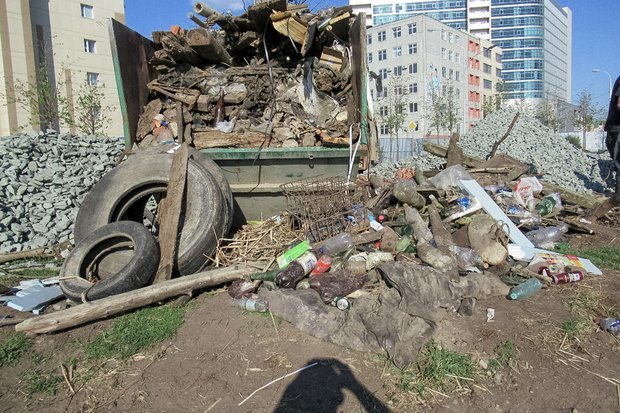
A contract to eradicate the illegal landfills in Vakhitovsky and Privolzhsky Districts of Kazan was signed last week. A contractor has already begun preparations to get rid of the landfill, the administration's representative assured. The deadline is in autumn.
30 WIPs in Switzerland burn 4 million tonnes of waste a year
TNV's correspondent visited a waste incineration plant in Lucerne, Switzerland. Switzerland, which is smaller than Tatarstan but has twice more inhabitants, has 30 waste incineration plants.
The country has four main principles of waste treatment: reduction of its quantity, reduction of the content of harmful substances in products, recycling of residues and treatment of residues that can't be recycled. All landfills and sites to bury waste have been legally prohibited in Switzerland since 2000. At the same time, the country recycles only 53% of its waste. An average Swiss generates 700 kg of residues a year – 355 kg are recycled, 353 kg are buried.
The waste incineration plant in Lucerne is in the countryside, the Alps are next to it. The factory is located in this place because a paper factory is close to it. It is the main consumer of heat and electricity that Lucerne generates. Thanks to the plant, the paper factory reduces fuel oil consumption by 40 million litres, thus reducing carbon dioxide emission into the atmosphere by 90,000 tonnes a year.
TNV's correspondent says there aren't unpleasant smells inside the plant thanks to a powerful exhaust hood and cleanliness. Waste gets to the WIP through sorting centres. One of them is ten kilometres far from the factory, not far from Zurich. In Switzerland, there is a principle ''the polluter pays'', a five-kilogramme bag with litter costs 1,5-2 francs. Those who have less litter pay less.
Apart from paper, glass, foam plastic, the plant separately accepts bottle corks, capsules for coffee machines. ''It's planned to construct a sorting complex in Kazan. It's supposed the population will start to sort litter on their own. The future sorting centre will be manually and mechanically sort dangerous waste, the waste that can be used again,'' claimed Elena Yamschikova, head ecologist of Alternative Generating Company No. 1.
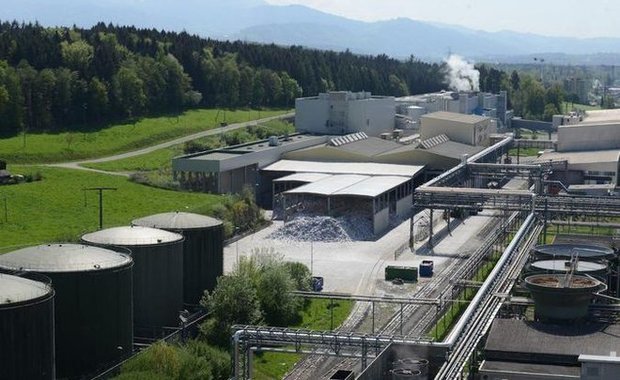
Not one waste sorting centre services the plant in Lucerne and similar plants. It's surprising that the plant would be able to deal with the waste that wasn't sorted. The waste incineration and flue gas purification technology has a very high endurance reserve. Speaking about dioxins that concern many people, 30 WIPs in Switzerland burn 4 million tonnes of waste a year and emit 2-3 grammes of dioxins into the atmosphere during the same period. The plant in Lucerne generates 0,0000000005 grammes of dioxins a year.
Rudy Kummer, the WIP's director, claimed that Switzerland even didn't have such a topic for discussion as dioxins at the moment. He says this topic is popular only for Russia. By the way, Moscow WIPs are already emitting an insignificant quantity of harmful substances, especially in comparison with the emissions of transport or your landfills. Hans Peter Farni, head of a waste management agency in Switzerland, added that, indeed, the factory emitted an insignificant quantity of nitrogen dioxins into the atmosphere. But this is almost nothing in comparison with the amount emitted by transport or fires in dachas. Waste incineration isn't among threats to Switzerland's ecology.
The flue gas purification system has several protection degrees. Electric filters separate fly ash, sock or fabric filter and sodium bicarbonate detain all acidic polluting substances. Slaked lime, activated carbon absorb what has still left – mercury and dioxins. It's the technology that's offered for the plant in Kazan almost in the same way. The filters don't need to be monthly changed. They've being used in the plant in Lucerne for 3 years already and will be applied for at least twice more than this term. Two workers constantly operate this equipment, while the staff consist of 30 people.
Being a neighbour of the WIP doesn't scare the citizens whose houses are near the plant. Farmer Baltasar Petermann lives 100 metres far from the WIP. He grew up here and isn't going to move anywhere. By the way, in Europe, the plants aren't called waste incineration plants but heat power plants running on residues, not habitual natural gas. Their main task is not to produce dangerous chemical compounds but destroy them.
To make sure the plants are safe, next time TNV's correspondents will go to Paris where a WIP is located right in the city centre.